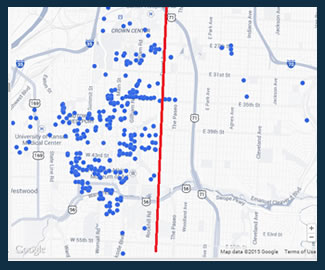Closing the Digital Divide
I was forty-five years old when the World Wide Web was invented in 1989. Up until the year 2000, my family did not have a personal computer, or a connection to the Internet. We picked up the phone or we sent a letter in the mail. These days, you can barely get by without it. I have a smartphone in my pocket, an iPad at home, and a desktop PC at both of my offices. Now, I still write my speeches out longhand. But when I need to change my health insurance, read the news, or listen to music, I sit down at my desk and get on the Internet. When I want to send you a message, it is in this newsletter, or on Facebook or Twitter. I'm even on Instagram and YouTube now.
The Internet is no longer a luxury. It is a necessity. Internet connectivity is opportunity. It is an opportunity to:
- Apply for jobs online
- Connect with family and friends
- Access Medicare, Medicaid, Social Security & other Social Services
- Find information about medical and health issues
- Enroll in internet-based GED classes and online higher education
- Look for deals or quotes in online shopping
- Search for cars and housing options
- Begin the path to integration and citizenship
And much more. In the heart of America, we have taken incredible initiative. This has allowed new technology, innovation, and economic development to flourish. Just a few years ago, on March 30, 2011, both Kansas City, Missouri and Kansas City, Kansas were chosen to be the launch sites for Google Fiber. I remember, as I am sure you do, how impressed I was, and how proud I was that once again, Missouri's Fifth District was leading the way. The entire Kansas City metro area was excited to be selected for this groundbreaking project.
Without a doubt, the investment that Google has made into Fiber in Kansas City has been an economic and entrepreneurial boon. Fiber has a tremendous influence on the development of Kansas City– potentially increasing property values, contributing to economic development, and attracting new entrepreneurs and businesses. And yet, the power it promises is also perilous for those who are precluded.
|
A map provided by Google shows apartments in |
By September 2012, the results of the Fiber pre-registration process were clear. According to the Wall Street Journal, just 10 percent of low-income neighborhoods subscribed to 1 gigabit Google Fiber and 5 percent to the 5-megabit service. In comparison, 42 percent of residents in middle and higher income neighborhoods took advantage of the 1-gigabit service, while 11 percent use the slower option.
Nearly all the neighborhoods that failed to qualify for the service were east of Troost Avenue, the city's historical socioeconomic dividing line. Digital registration for the digitally divided simply did not work.
Twenty-five percent of Kansas Citians don't have access to the Internet at home. A whopping seventy-five percent of children in Kansas City Public Schools don't have an Internet connection at home. These differences highlight the challenges we face if we truly wish to address Kansas City's current digital divide.
These statistics suggest the beginning of potential "digital redlining" in our city. If you are fortunate enough not to know what redlining is, it is a kind of systematic discrimination where services are either more expensive, or not available at all, to people who live in certain neighborhoods on the basis of their race, class, or status. It has been used for decades to deny access to basic services to people simply because they live on the wrong side of the tracks.
This is why I wrote to Google and to the Kansas City Housing Authority. I know that we can work together, with all community stakeholders, to solve this problem. You can read my letter to Google here. In Missouri's Fifth District and across the nation, we cannot let the digital divide stand in the way of achieving the American dream. As the newly appointed Ranking Democratic Member of the Subcommittee on Housing and Insurance, one of my top priorities will be to ensure that low-income and vulnerable communities have the resources they need to succeed and remain free from digital redlining. Together, we can make Kansas City the national model for connecting the unconnected and expanding opportunity for our constituents and communities.
